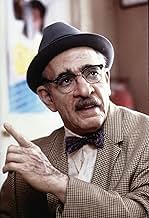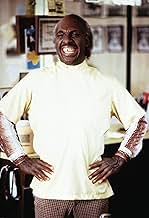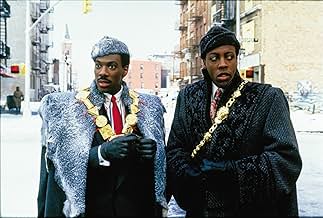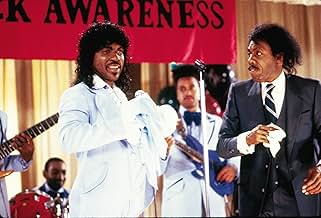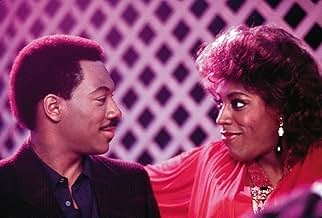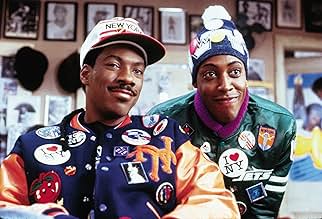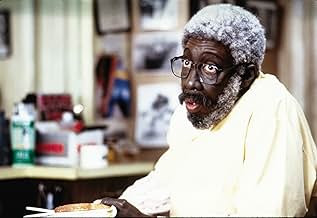An extremely pampered African prince travels to Queens, New York and goes undercover to find a wife that he can respect for her intelligence and strong will.An extremely pampered African prince travels to Queens, New York and goes undercover to find a wife that he can respect for her intelligence and strong will.An extremely pampered African prince travels to Queens, New York and goes undercover to find a wife that he can respect for her intelligence and strong will.
- Nominated for 2 Oscars
- 5 wins & 5 nominations total
Vanessa Bell Calloway
- Imani Izzi
- (as Vanessa Bell)
- Director
- Writers
- All cast & crew
- Production, box office & more at IMDbPro
Eddie Murphy Through the Years
Eddie Murphy Through the Years
From Reggie Hammond in 48 Hrs. to Chris Carver in Candy Cane Lane, take a look back at the iconic career of Eddie Murphy.
Storyline
Did you know
- TriviaAfter the make-up and clothing was applied for the Jewish character Saul, Eddie Murphy wanted to test the make-up and costume out. He got a golf cart and drove from one studio department to another in Paramount Studios. He would get out of the cart and say in his regular voice, "Hi. I'm Eddie Murphy." No one believed him.
- Goofs(at around 29 mins) When the landlord describes the apartment to Akeem and Semi, he says "it's only got one window, facing a brick wall." In the next scene, Akeem is out on a balcony which is accessed through a window. In the same shot, Semi opens another window directly to Akeem's left to speak with him. There is also another window directly to Akeem's right which appears to be from the same apartment.
- Quotes
Prince Akeem: [shouting from the outside fire escape of his apartment in a rough part of Queens, New York] Good morning, my neighbors!
Voice: Hey, fuck you!
Prince Akeem: [blissfully ignorant of what this means] Yes! Yes! Fuck you too!
- Crazy creditsThe "thanks" list in the closing credits lists the fictitious Zamundan Film Commission.
- ConnectionsEdited into Yoostar 2: In the Movies (2011)
- SoundtracksComing To America
Written by Nile Rodgers and Nancy Huang
Performed by The System
Produced by Nile Rodgers, Mic Murphy, and David Frank
Featured review
"Coming to America" is one of these films that best exemplifies the 80's exuberance and unique appeal, it's raunchy and outrageous on the surface but sweet and good-hearted inside. And the film carries such a tender naivety in its portrayal of the fictional country of Zamunda and Royal Family's lifestyle that it makes today's films depressingly cynical in their desperate attempt to copy reality by any means or feature likable losers making their bones on redeeming bitches.
Yes, a country like Zamunda is very improbable but that makes the beginning of the film so fascinating. That Prince Akeem, waking up on his 21st birthday, would be treated with such an exaggerated devotion echoes one of Cinema's greatest values: escapism and dream. It doesn't work in every case but here it does and for a simple reason: the "Coming to America" plot line perfectly contrasts with the "Coming from Zamunda"set-up, Zamunda had to be in a total opposition with New York for the film's own comedic purposes. It doesn't avoid some clichés like the passing of zebras and elephants to show that the film is set in the African continent, yet it's one of these moments we remember the most from the film just before, as the trailer says, the fairy tale stops as soon as the first shot of New York City appears.
"Coming to America", directed by John Landis and starring Eddie Murphy, is in the same vein than their previous work in "Trading Places", a movie that I compared to Frank Capra's classics. Only this time, it's not a wags to riches story but quite the opposite, it's a Cinderella story told in reverse since it's the Prince Akeem who comes to America to marry a woman, and as he explains to his friend Semmi (Aresnio Hall) : "I want a woman who will arouse my intellect as well as my loins". This premise leads to a succession of situations so funny that you almost forget about the romantic purpose of Prince Akeem's trip and the presence of Arsenio Hall as the second lead of the film is responsible of that as he literally outshines all the other cast members and creates the perfect comic-straight man duo that this kind of stories need. Semi's priceless look from the window when Akeem shouts: "Life. Real life! A thing that we have been denied for far too long!" is the perfect counterpart to Akeem's naive enthusiasm as he joyfully gives the F-word back to an angry neighbor.
After they find a place to live and a job, the whole New York's discovery part is a tribute to the actors' extraordinary talent to portray different characters from chatting barbers to drags, from singers to pervert reverends, they both nail their roles and we, as viewers, are invited to spot them every once in a while. Eddie Murphy is top notch as the old Jewish man in the barbershop, such an uncanny impression that I admit it fooled me the first time I saw it. The beauty of "Coming to Africa" is that it features two levels of true appreciation, one on the story and another through a series of sketch-like vignettes demonstrating two sides of the actors' talent, without overdoing them. In a way, "Coming to America" prefigures the appeal of Eddie Murphy's "Nutty Professor" and his wonderful talent as a comedian when given a good role, and Prince Akeem is one of his best. But to attribute the success of the film only on Eddie Murphy's talent would be untrue, and even more unfair.
Another force of the film relies on the whole casting, starting with the perfect couple that could have ever played Akeem's parents: James Earl Jones as the authoritarian King Jaffe Joffe and Madge Sinclair as the most comprehensive mother but no less Queen Aoloan, both who'd team up later to play much ore memorable royal couple in a certain Disney film set in Africa. Both Jones and Sinclair possess a majestic and absolutely irresistible aura, and the powerful image of King Jaffe Joffe inspires an ominous sensation beautifully conveyed by the music that accompanies his own entrance in New York. The rest of the cast include another veteran actor, John Amos, as the McDowell restaurant chain owner, Shari Hadley as his beautiful daughter, Eriq La Salle as her soon-to-be ex-boyfriend, Samuel L. Jackson in his typical scene-stealing 80's supporting roles and it also features briefs but heart-warming cameos of Don Ameche and Ralph Bellamy as you know, and if you don't, well, make a guess.
As a comedy and romance (not a romantic comedy, mind you) the film is not without some predictable situations, but it delivers what is expected, it's funny, it has a happy ending, and most of hits scenes can be watched regardless of their context. It's a great movie to watch and re-watch and its classical status can't be denied, since 24 years later after its release, the image of Murphy as the Old Jewish man, Arsenio Hall as a woman, the McDowell's logo and the unforgettable 'Soul Glo' will forever be associated with the 80's, a decade where movies were made just for fun and only for fun.
Yes, a country like Zamunda is very improbable but that makes the beginning of the film so fascinating. That Prince Akeem, waking up on his 21st birthday, would be treated with such an exaggerated devotion echoes one of Cinema's greatest values: escapism and dream. It doesn't work in every case but here it does and for a simple reason: the "Coming to America" plot line perfectly contrasts with the "Coming from Zamunda"set-up, Zamunda had to be in a total opposition with New York for the film's own comedic purposes. It doesn't avoid some clichés like the passing of zebras and elephants to show that the film is set in the African continent, yet it's one of these moments we remember the most from the film just before, as the trailer says, the fairy tale stops as soon as the first shot of New York City appears.
"Coming to America", directed by John Landis and starring Eddie Murphy, is in the same vein than their previous work in "Trading Places", a movie that I compared to Frank Capra's classics. Only this time, it's not a wags to riches story but quite the opposite, it's a Cinderella story told in reverse since it's the Prince Akeem who comes to America to marry a woman, and as he explains to his friend Semmi (Aresnio Hall) : "I want a woman who will arouse my intellect as well as my loins". This premise leads to a succession of situations so funny that you almost forget about the romantic purpose of Prince Akeem's trip and the presence of Arsenio Hall as the second lead of the film is responsible of that as he literally outshines all the other cast members and creates the perfect comic-straight man duo that this kind of stories need. Semi's priceless look from the window when Akeem shouts: "Life. Real life! A thing that we have been denied for far too long!" is the perfect counterpart to Akeem's naive enthusiasm as he joyfully gives the F-word back to an angry neighbor.
After they find a place to live and a job, the whole New York's discovery part is a tribute to the actors' extraordinary talent to portray different characters from chatting barbers to drags, from singers to pervert reverends, they both nail their roles and we, as viewers, are invited to spot them every once in a while. Eddie Murphy is top notch as the old Jewish man in the barbershop, such an uncanny impression that I admit it fooled me the first time I saw it. The beauty of "Coming to Africa" is that it features two levels of true appreciation, one on the story and another through a series of sketch-like vignettes demonstrating two sides of the actors' talent, without overdoing them. In a way, "Coming to America" prefigures the appeal of Eddie Murphy's "Nutty Professor" and his wonderful talent as a comedian when given a good role, and Prince Akeem is one of his best. But to attribute the success of the film only on Eddie Murphy's talent would be untrue, and even more unfair.
Another force of the film relies on the whole casting, starting with the perfect couple that could have ever played Akeem's parents: James Earl Jones as the authoritarian King Jaffe Joffe and Madge Sinclair as the most comprehensive mother but no less Queen Aoloan, both who'd team up later to play much ore memorable royal couple in a certain Disney film set in Africa. Both Jones and Sinclair possess a majestic and absolutely irresistible aura, and the powerful image of King Jaffe Joffe inspires an ominous sensation beautifully conveyed by the music that accompanies his own entrance in New York. The rest of the cast include another veteran actor, John Amos, as the McDowell restaurant chain owner, Shari Hadley as his beautiful daughter, Eriq La Salle as her soon-to-be ex-boyfriend, Samuel L. Jackson in his typical scene-stealing 80's supporting roles and it also features briefs but heart-warming cameos of Don Ameche and Ralph Bellamy as you know, and if you don't, well, make a guess.
As a comedy and romance (not a romantic comedy, mind you) the film is not without some predictable situations, but it delivers what is expected, it's funny, it has a happy ending, and most of hits scenes can be watched regardless of their context. It's a great movie to watch and re-watch and its classical status can't be denied, since 24 years later after its release, the image of Murphy as the Old Jewish man, Arsenio Hall as a woman, the McDowell's logo and the unforgettable 'Soul Glo' will forever be associated with the 80's, a decade where movies were made just for fun and only for fun.
- ElMaruecan82
- Apr 16, 2012
- Permalink
Details
- Release date
- Country of origin
- Language
- Also known as
- Un príncipe en Nueva York
- Filming locations
- 392 S 5th Street, Brooklyn, New York, USA(Apartment & Barber Shop)
- Production companies
- See more company credits at IMDbPro
Box office
- Budget
- $30,000,000 (estimated)
- Gross US & Canada
- $128,152,301
- Opening weekend US & Canada
- $21,404,420
- Jul 4, 1988
- Gross worldwide
- $288,752,301
- Runtime1 hour 57 minutes
- Color
- Sound mix
- Aspect ratio
- 1.85 : 1
Contribute to this page
Suggest an edit or add missing content







